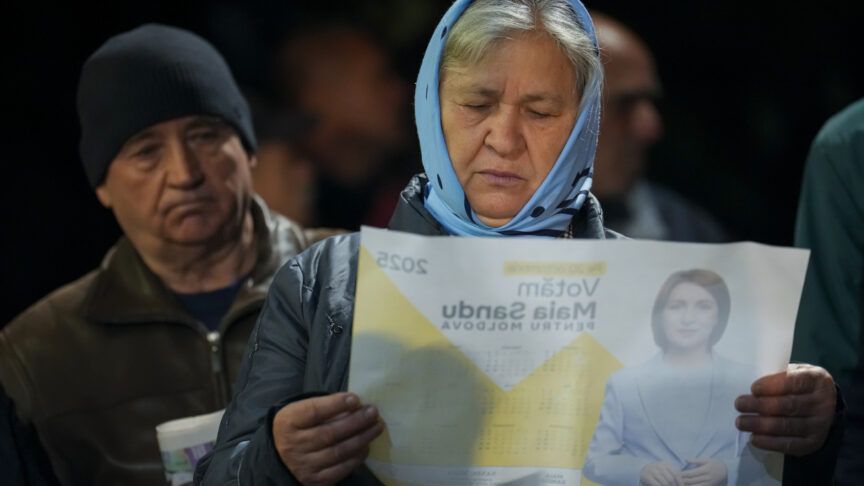How Macron can strengthen the EU in the Western Balkans
France has blocked progress on enlargement in the Western Balkans. In the Biden era, Emmanuel Macron should think again about bringing the region into the EU
This month’s snap election in Kosovo produced a clear winner in the form of the left-wing Vetëvendosje party. But it also raised new questions about the future of the Kosovo-Serbia dialogue – the principal forum through which the two countries interact on political matters. In the run-up to the poll, the newly elected Kosovo leaders gave clear signals that the dialogue was not among their priorities. If the dialogue is to succeed, it will therefore likely need a push from elsewhere, most particularly from external political figures.
One such figure could be Emmanuel Macron. He comes with strong credentials in Kosovo, having long demonstrated a commitment to the Western Balkans. In 2018 he received former president Hashim Thaci in a working meeting in Paris where he expressed his willingness to push forward the dialogue. Macron has also moved to strengthen France’s relationship with Serbia, welcoming its president, Aleksandar Vucic, to Paris earlier this month. Macron himself visited Serbia in 2019, when multiple bilateral agreements were signed, including for investment in Belgrade airport, for the construction of the Belgrade subway, and an agreement between defence ministries for the purchase of French Mistral 3 short-range air defence systems.
France is one of Kosovo’s key partners and strongest European supporters of its independence and democratic state building. In 2008, it was the first European country to recognise Kosovo’s declaration of independence. France has deployed around 7,000 soldiers in the NATO-led international peacekeeping force in Kosovo (KFOR) since 1999. Kosovo’s governments have continuously demonstrated gratitude for France’s support and have strengthened their cooperation with France in various domains. This even, for example, includes Kosovo joining the International Organisation of Francophonie.
Macron has made his presence felt in the region in other ways too, not least in 2019 when he blocked North Macedonia’s and Albania’s EU accession prospects. A major obstacle in the recent history of European Union-Western Balkans relationship is that Macron believes in reforming the EU before it accepts new candidates. This has been frustrating for political leaders in the Western Balkans but also for Angela Merkel, who has long pressed for enlargement to the region. Macron’s stance has also weakened the EU itself: France’s veto two years ago greatly discredited enlargement policy as a foreign policy instrument, and among hopeful countries it undermined confidence about whether they could rely on Brussels and major member states. In 2020, EU enlargement reached yet another impasse when Bulgaria vetoed the opening of talks with North Macedonia.
Failing to enlarge to the Western Balkan poses a security threat not only for the vulnerable countries of the region, but also creates risks for the EU and its member states. At the moment, there are no domestic reasons for Macron to change his stance. But, were he to do so, it would have significant consequences in the region. Such a change in position could push forward progress in two related areas: the relationship between Kosovo and Serbia, and the strengthening of security in the region.
Kosovo-Serbia dialogue
The protracted conflict between Kosovo and Serbia is a major issue that requires particular attention and political support from the EU. Finding a sustainable solution has become increasingly complex in recent years. The EU-facilitated dialogue has encountered many obstacles, such as the collapse of territory swap discussions between the presidents of the two countries in 2018 and 2019. The issue of a territory swap is now off the table but the EU has still struggled to agree a unified stance on the dialogue, and on Kosovo itself. France and Germany together have the most leverage in the region out of all the EU countries. Merkel in particular has cultivated direct relations with regional leaders and over the past 15 years has developed a rich understanding of Western Balkans political processes. But Macron is also well placed to exercise greater influence given his past commitment to helping the parties restart the dialogue, including holding a joint Kosovo-Serbia summit with Merkel in summer 2020 and meeting delegations of both countries on separate occasions.
Berlin, Paris, Brussels, and Washington welcomed the recent election results but remain concerned about whether the new Kosovar leaders will engage in the dialogue with Serbia. The incoming prime minister of Kosovo, Albin Kurti, has criticised the dialogue led by the previous governments. Yet in the messages of congratulation he received from Brussels and from Berlin and Paris, it is clear that the EU is keen to continue facilitating the dialogue.
Macron can give the dialogue a boost by making clear his full support for strengthening the EU’s foreign policy towards the region and in particular towards the dialogue. The EU needs to demonstrate that it is capable of taking ownership of issues in its continent, be it within the EU or in its neighbourhood. Macron’s political support in Europe for this process is therefore essential. There is no doubt that Joe Biden will maintain his support for Kosovo and for a peace agreement between Serbia and Kosovo founded on mutual recognition. The US president already addressed this matter formally in letters to Vucic and the acting president of Kosovo, Vjosa Osmani. And Biden – unlike Donald Trump – will empower his European partners to move this European matter forward.
Finally, if Macron continues to defend the concept of European strategic autonomy and a “stronger political Europe”, placing himself as leading on this, he cannot afford to allow European interests in the Western Balkans be compromised by Russia and China.
Security in the Western Balkans
A sustainable agreement between Serbia and Kosovo that entails mutual recognition and good neighbourly relations looks unlikely as long as France refuses to change its position on enlargement. Without France supporting Serbia’s accession process, Belgrade will have no incentive to work to conclude a peace agreement with Kosovo. Vucic will be happy enough to maintain the no-deal status quo with Kosovo, which poses a real security concern in the medium term.
If Macron wants to stay loyal in his pursuit of European strategic autonomy, then he should be more alert to Europe’s role in the security of the Western Balkans
However, if Macron does maintain his current position on enlargement, then he should explore creative alternatives that would strengthen his position vis-à-vis Serbia and the whole region. He has made some concrete effort as described above, but more is needed. Serbia remains Russia’s ally in the Western Balkans and a purchaser of Russian military and defence equipment – including last year’s acquisition of the Russian Pantsir S1 air-defence missile systems. In 2020 it was also the first European country to buy Chinese CH-92A military drones and FK-3 air defence systems. France should therefore strengthen its cooperation with both Serbia and Kosovo in terms of security. This could include military and intelligence cooperation, cyber security, and the fight against disinformation. It should also persuade other European states and institutions to pursue a more relevant European security policy for the countries of the Western Balkans. This is crucial to ensure that Europe’s interests are not compromised by Russia’s influence in the Western Balkans. Russia’s opening of a defence liaison office in Serbia in 2020 is an example of the country’s active engagement with Serbia, with the aim of maintaining its influence in the region. This should be a real cause of concern not only for Kosovo and Bosnia, but for France and other European countries too.
France can also deliver more in Kosovo. It can start by lifting its veto on EU visa liberalisation for Kosovars – an unfair policy that relies on unsustainable arguments about the only Western Balkans country left without a visa-free regime with the EU. Macron could also work on persuading the five remaining member states of the EU that do not recognise Kosovo to change their position and support its EU integration path (without receiving majority consent by all 27 EU member states, Kosovo will not continue its integration process into the EU). This has so far been a major hindrance to an EU that wants to demonstrate a unified foreign policy in its own backyard. Finally, Kosovo still aspires to NATO membership, and is strongly supported in this by the United States. As a driving force within the EU, France should back Kosovo in this as an imperative for regional security.
France could be the main player that restarts progress in the Western Balkans. To begin with, it should reconsider its position towards enlargement, which will remain the strongest – and perhaps only real – leverage Macron is going to give in efforts to achieve concrete results that benefit Europe’s long-term European security. And, if Macron wants to stay loyal in his pursuit of European strategic autonomy, then he should be more alert to Europe’s role in the security of the Western Balkans. This becomes especially important with the imminent departure from German politics of Merkel, to whom countries of the Western Balkans in the past always looked to for support and solidarity. France and Germany should use the Biden reset of EU-US relations to work on renewing their unity and recommitting to a stronger transatlantic cooperation on the security of the Western Balkans.
The European Council on Foreign Relations does not take collective positions. ECFR publications only represent the views of their individual authors.



